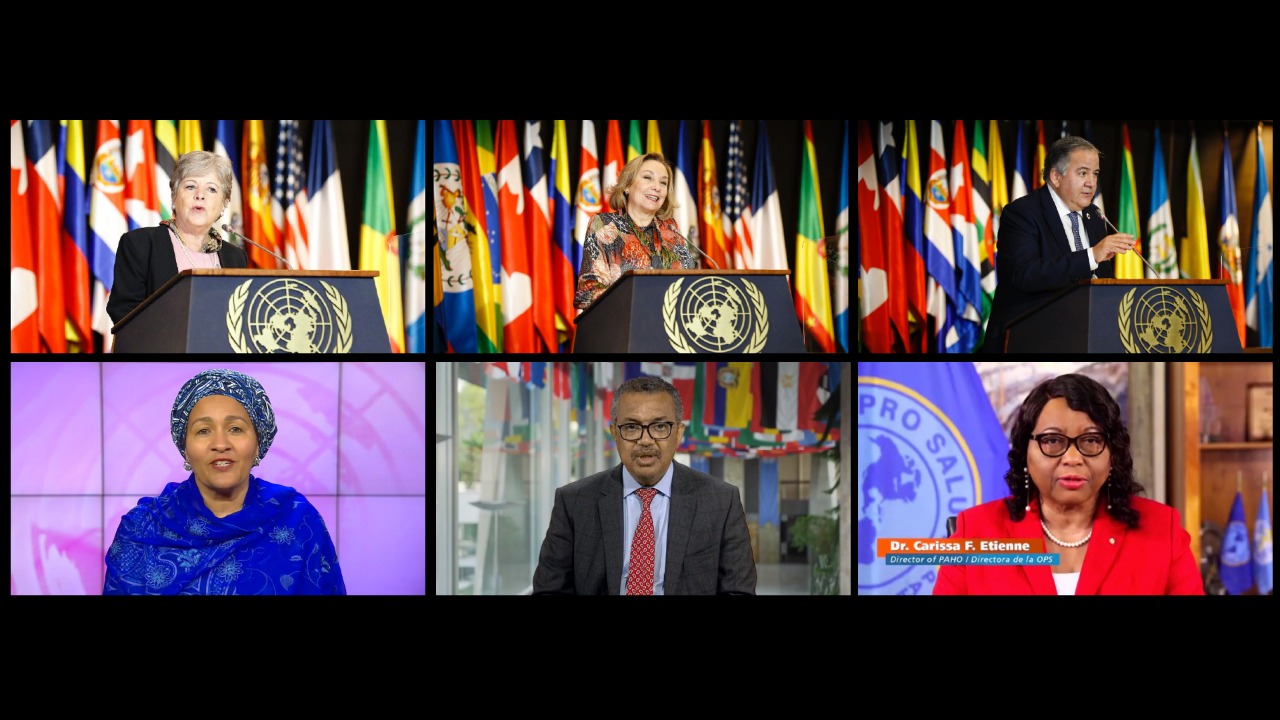Older Persons’ Rights Must Be at the Center of Public Policy Responses with a Human Rights, Gender and Interculturality Perspective
Work area(s)
Authorities from the region participated today in a ceremony for the Americas launch of the United Nations Decade of Healthy Aging 2021-2030, organized by the Government of Chile, ECLAC and PAHO.

The rights of older persons must be at the center of public policy responses with a human rights, gender and interculturality perspective, Latin American and Caribbean authorities sustained at a ceremony to launch the United Nations Decade of Healthy Aging 2021-2030 in the Americas, which took place today at the headquarters of the Economic Commission for Latin America and the Caribbean (ECLAC) in Santiago, Chile.
The event – organized by the Government of Chile, the Pan American Health Organization (PAHO) and ECLAC – was inaugurated by Alicia Bárcena, Executive Secretary of ECLAC; Amina Mohammed, Deputy Secretary-General of the UN (via written message); Cecilia Morel, First Lady of Chile; Tedros Adhanom Ghebreyesus, Director-General of the World Health Organization (via video); Carissa Etienne, Director of PAHO; and Miguel Barreto, acting UN Resident Coordinator in Chile.
The gathering’s closing session was led by Julio Borba, Minister of Public Health and Social Welfare of Paraguay (via video), who is the current chair of the Regional Intergovernmental Conference on Aging and the Rights of Older Persons, and Karla Rubilar, Minister of Social Development and Family of Chile.
Also participating in the event were Enrique Paris, Minister of Health of Chile; Ryan R. Straughn, Minister of Finance of Barbados; Mónica Roqué, Secretary General of Human Rights, Community Gerontology, Gender and Care Policies at the National Institute of Social Services for Retirees and Pensioners (PAMI) of Argentina; Francisco Delgado, Vice Minister of Human Development and Social Inclusion of Costa Rica; and Luis Miguel Gutiérrez, Director General of the National Institute of Geriatrics of Mexico. Serving as moderators were José Luis Balmaceda, International Affairs advisor at the Ministry of Social Development of Chile, and Jarbas Barbosa, Assistant Director of PAHO.
In her remarks, Alicia Bárcena, ECLAC’s Executive Secretary, emphasized that aging is a matter of the highest priority that requires urgent action in various spheres, starting with rendering it visible and rethinking it from a human rights, gender and interculturality perspective to shape public policies.
She specified that UN estimates and projections indicate that as of 2021, there are around 88 million people aged 60 and over in Latin America and the Caribbean, representing 13.3% of our total population.
By the end of the Decade of Healthy Aging, in 2030, the population aged 60 and over will have increased by 30 million in the region, reaching 118 million or 16.7% of the total population, while people 80 and older will number more than 18 million, representing 2.6% of the overall population. By 2050, it is estimated that the age group of people 60 and over will encompass 190 million people, representing around 25% of the regional population. And the group of people who are 80 and older – which is the segment with the most dynamic growth – will nearly triple its proportion in the next 30 years, rising from 2% to nearly 5.5% and reaching a total of approximately 41.5 million people by 2050.
“It is indispensable to put the protection of older persons’ rights at the center of public policy responses again, and to incorporate the vision and commitments emanating from a multiplicity of international and regional instruments and agreements,” ECLAC’s Executive Secretary underscored.
She also stressed the urgency of moving towards a care society that would prioritize the sustainability of life and caring for the planet and would guarantee the rights of people who require care at any point in their lifetimes, along with the rights of the people who provide such care; that would take into account self-care, counteract the precarity of jobs related to the care sector, and render visible the multiplier effects of the care economy in terms of welfare and as a driving sector for a transformative recovery with equality and sustainability.
The United Nations Deputy Secretary-General, Amina Mohammed, meanwhile, affirmed in a written message that the COVID-19 pandemic has exposed gaps and fragility in many systems intended to support older persons, from health to long-term care and support, to social protection, labor, housing and transport.
“The UN Decade of Healthy Aging provides an opportunity for coordinated and concerted action to address these gaps and improve the physical and mental health and well-being of older people,” she indicated.
At the event’s inauguration, Cecilia Morel, the First Lady of Chile, stated that the Decade of Healthy Aging offers the possibility of accelerating public policy processes by bringing together different sectors such as the public and private worlds, academia and civil society.
“Older persons are at the center of the Decade, which means their voice is fundamental for being able to move towards a more egalitarian society, guiding policies, plans and programs towards a healthy and positive aging process, tearing down myths and prejudices regarding old age and aging,” she emphasized.
In his remarks, Tedros Adhanom Ghebreyesus, Director-General of WHO, noted that the pandemic has taken a heavy toll on the physical and mental health of older persons.
“The adoption of the UN Decade of Healthy Aging recognizes the need to improve the lives of older people, their families and communities,” he stated.
Carissa Etienne, Director of PAHO, indicated that the Decade of Healthy Aging is an opportunity to bring together leaders, governments, international organizations, academia and the media to work together on improving the lives of older persons, their families and communities.
Finally, Miguel Barreto, acting UN Resident Coordinator in Chile, recalled that until recently, the aging of the population was considered to be an issue of the future that only concerned a small group of people and countries. Today, it is not only an issue of the present but also an urgent challenge for the entire world, he contended.
The UN Decade of Healthy Aging (2021-2030) was presented by Chile and Japan and approved by the General Assembly on December 14, 2020. It has 4 action areas: 1) Changing the way we think, feel and act towards age and aging; 2) Ensuring that communities foster the capacities of older people; 3) Delivering person-centered integrated care and primary health services responsive to older people; 4) Providing access to long-term care for older people who need it.
Type
Country(ies)
- Latin America and the Caribbean
